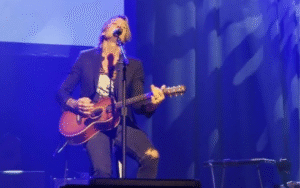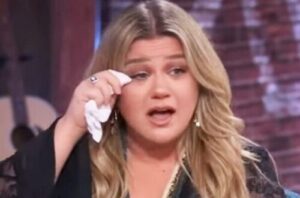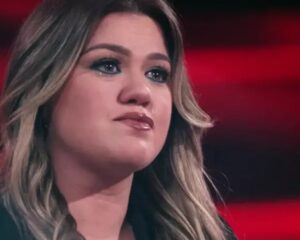Under One Light in Nashville: Keith Urban’s Unscripted Prayer for Brandon

Ninety-two days after the world lost Brandon Blackstock, Nashville gathered for another sold-out night at Bridgestone Arena. It was November 6—bright marquees, denim jackets, the low thrum of conversation that always precedes a Keith Urban show. Fans expected sing-along catharsis, quicksilver guitar runs, and the usual stadium sparkle. They didn’t expect the stillness.
Urban moved through the first half of his set with the ease of a lifer—“Somebody Like You,” “Blue Ain’t Your Color,” “Wasted Time”—thousands of voices stitching themselves to each chorus. Then the screens went dark. The band fell away. A single spotlight found him at center stage.
He lifted one hand, asked the room for quiet, and drew a long breath you could feel in the upper deck.
“This next one,” he said, voice catching on the edges, “is for a friend who should still be here.”
“Chuck Taylors”: A song carried like a candle
What followed wasn’t a showpiece; it was a vigil. He eased into a bare melody—just wood, wire, and breath—introducing a new song, “Chuck Taylors,” a tribute in plain speech and tender images. Each line felt handwritten in the moment, like a note slipped under a door at midnight:
In between the silence, you and me talked all night…
You wore those old Chuck Taylors like they were made for heaven’s gate…
You could hear the soft whirr of an amp, the small sound of someone crying two sections over. The jumbo screens showed nothing but a single candle on black, its flame unblinking. For nearly five minutes, no one moved. When the last chord went to ground, the arena stayed silent long enough to become holy—and then the applause came, not as thunder but as a swell, row by row, like tide returning to a shore.
Urban bowed his head, whispered a thank-you, and let the moment stand on its own.
Context: Blackstock, a talent manager and Kelly Clarkson’s former husband, died in August 2025 after a multi-year cancer battle. The news drew tributes across the industry and space for Clarkson to be with their children. AP News+2People.com+2

A seat in the dark for Kelly
Accounts from that night say Kelly Clarkson was in the building—low brim, quiet corner, there to hear a friend sing what she couldn’t yet bring herself to say out loud. When “Chuck Taylors” began, the witnesses near her say she wept; when it ended, she stood and mouthed “thank you,” a gesture small enough to feel private in a room of thousands.
Later, a short post—just a few lines—made its way online: gratitude, ache, and an admission that the song had reached where words hadn’t. The internet carried it the way people carry news after a vigil—carefully, hand to hand.
When a concert becomes communion
Clips from the night spread within hours, captioned less like reviews and more like testimony: He didn’t perform; he prayed. We all prayed with him. Strangers compared notes on the same feeling—how grief can be met, gently, by something as simple as one voice and six strings.
The title itself told a story. People who knew Brandon remembered the sneakers: those classic canvas shoes under suits at industry things, scuffed just enough to look honest. Urban would later say that’s partly why the song found its name—because some details, like love, wear in rather than out.
Note: “Chuck Taylors” is a real Keith Urban release (later included on HIGH) and a recurring part of his 2024–2025 set lists, though the Nashville tribute described here has been shared primarily through fan posts and attendee reports. YouTube+2YouTube+2

The ripple after the hush
In the days that followed, a small movement began. Fans posted photos of loved ones’ worn-in shoes, writing the names they couldn’t say without breaking. A hashtag bloomed. Stories poured out—parents, partners, friends—each one its own lantern against the night.
An intimate acoustic version appeared online. Proceeds were directed to grief and mental-health causes; the track rose fast because people weren’t just listening—they were being listened to.
What the daughters saw
From a box above the floor, Urban’s family watched. One of his daughters, eyes glassed with tears, leaned close to her mother: He’s singing with his heart. Long after the spotlight cooled, that might be the lesson that lasts: how to stand bare in front of a crowd and choose sincerity over spectacle.
The city keeps talking
Nashville measures nights by volume—how loud the amps, how long the ovation. This one was measured by silence. Bartenders, rideshare drivers, and stagehands kept retelling the same scene: a single light, a single voice, and the feeling you get at a funeral when someone tells a story that makes everyone laugh through tears.
At a neighborhood record shop, a small makeshift memorial appeared by a Keith Urban poster: flowers, a pair of faded Chucks, and a note in block letters—For everyone we’ve lost. Thank you for reminding us to remember.
The long echo
Clarkson later said the song helped her tell their children something true: that love doesn’t leave; it changes shape. Which is maybe what the night was after all—a shape love can take when there’s nothing else to do but name the person and keep a seat for them in the music.
Urban has been asked if he’ll play “Chuck Taylors” like that again. Maybe, he’s said. But even if he never does, the room that held it already knows: sometimes the bravest thing an artist can do is set the show down, invite the silence in, and sing a friend’s name without a net.
When the arena finally emptied, people lingered in the lot—arms around shoulders, eyes tilted to a November sky, the chorus still moving under their breath. They didn’t want the feeling to end because it didn’t feel like ending. It felt like carrying.
For one night in Nashville, the loudest city in country music learned again that the strongest sound isn’t volume. It’s a heart, open, under one light—singing a pair of shoes into a story, and a story into a kind of grace that lasts longer than any final chord.